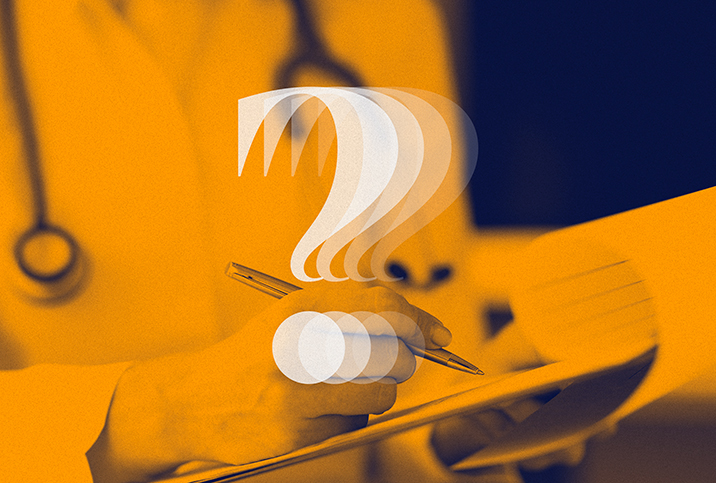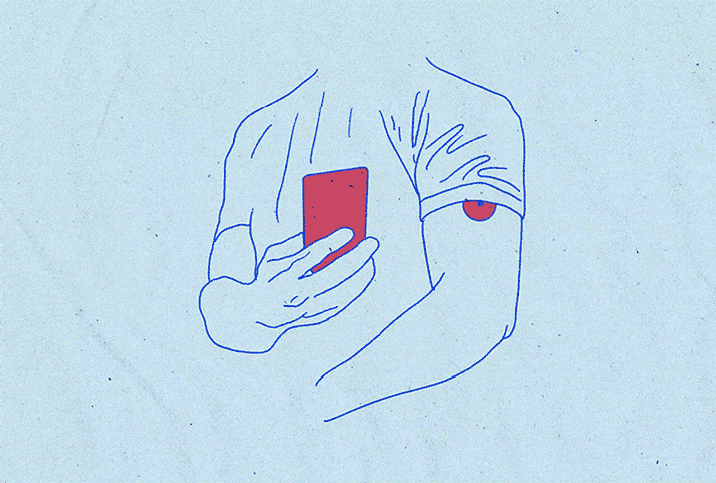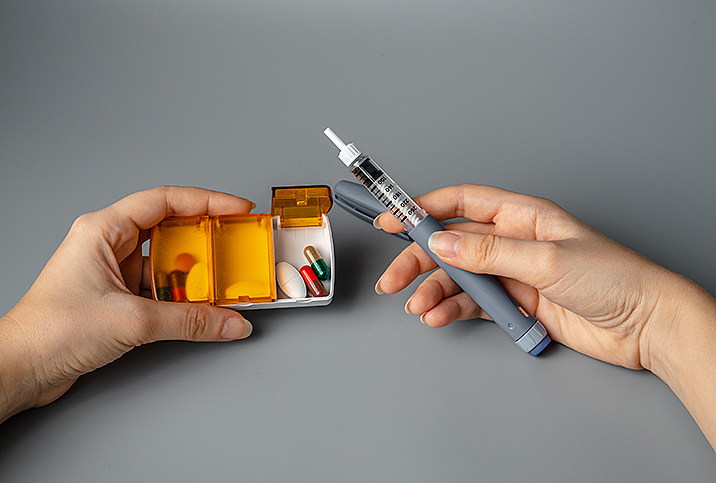OK, Let's Make This Simple: Here's How ED and Diabetes Are Connected

The connection between diabetes and erectile dysfunction (ED) has long been established. Men with diabetes are three times more likely to suffer from ED, according to the Centers for Disease Control and Prevention.
However, the "how" of their connection is less clear. Diabetes isn't typically associated with "sexual health," though everything in the body is connected in some way and these connections can cause unforeseen problems.
Diabetes is a chronic disease that affects how the body processes blood sugar, otherwise known as glucose. People with type 1 diabetes don't produce insulin at all, while people with the more common type 2 diabetes do produce insulin, but the body doesn't utilize it properly to maintain glucose levels.
Erectile dysfunction affects a majority of men at some point in their lives and can be attributed to a number of issues beyond diabetes, including heart disease and other vascular problems, obesity, stress, mental health disorders, drug and alcohol abuse, medication, and low testosterone levels.
Many factors come into play
Essentially, many different elements can contribute to both ED and type 2 diabetes.
"Several identified factors may contribute to the complex pathogenesis of diabetes-related erectile dysfunction, including diabetic neuropathy, micro- and macrovascular arterial disease, hypogonadism, psychogenic components and drug side effects," said Emil Andersen, an epigenetics researcher and the cofounder of ExSeed Health, a male fertility center with offices in London and Copenhagen, Denmark.
Another notable factor is obesity. A 2019 study found obesity and ED share an internal pathological environment, thus, in order to effectively manage ED in obese patients, the obesity should be treated first or in combination with ED treatment.
Similarly, a 2018 study reasserted the link between obesity and diabetes, citing excessive weight as a cause for both the initial onset of diabetes and the gradual worsening of symptoms.
Of course, obese men and those with type 2 diabetes are not the only ones who experience erectile problems. Men with type 1 diabetes face a similar risk of developing ED, even though their disease is genetic rather than the result of both genetic and nongenetic factors associated with type 2 diabetes.
"Indeed, advancing age, duration of diabetes, poor glycemic control, hypertension, hyperlipidemia, a sedentary lifestyle, smoking and the presence of other diabetic complications have been shown to be associated with diabetes-related erectile dysfunction in cross-sectional studies," Andersen said.
Physical and mental impacts
For people with diabetes, the lack of insulin or the disruption of the metabolic process relating to insulin means that when diabetes is left untreated, glucose builds up throughout the blood rather than being converted into energy. Commonly, this leads to fatigue and causes the body's cells to turn to other forms of energy, namely fat and muscle, leading to weight loss.
Inversely, a patient with diabetes who injects too much insulin can cause an overconsumption of glucose by the body's cells, making the patient confused and dizzy with the potential to faint. In some cases, this can cause a response in the nervous system, as nerve cells exclusively require glucose for energy. Nerve damage is another known cause of ED.
Stress, depression and other mental health issues may also play into the development of ED, and can be symptoms of dealing with diabetes. Furthermore, many drugs used to treat mental health disorders, such as antidepressants, have possible side effects that include decreased sex drive, which may lead to difficulty maintaining an erection.
Additionally, studies have shown a link between diabetes, stress and chronic inflammation. Insulin inhibition caused by diabetes leads to mass, low-grade inflammation in cells, which subsequently puts the body under stress, both mentally and physically.
"Healthy cells have a normal rate of regulation for metabolizing fats [lipids] for the energy they need," said Dan Sperling, a uroradiologist and founder of Sperling Prostate Center in Delray Beach, Florida. "Chronic inflammation irritates cells, and this stress affects the normal processes by which each cell gets the fuel it needs [metabolism], is able to protect itself [compromised immunity] and regenerates."
Mental stress can lead to ED simply by being a horrible distraction from sexual activity—a man might be too worried about other things to maintain an erection—but the physical stress of diabetes-related inflammation can cause parts of the body to perform inadequately or fail outright.
One area is testosterone production, Andersen said. Testosterone levels can be affected by insulin resistance, glycemic control, obesity and other chronic conditions, such as high blood pressure, high cholesterol and hardening of the arteries.
Unregulated and out-of-control amounts of blood sugar can cause serious, long-term damage to blood vessels—including the ones in the penis. Given that blood flow to the penis is essential for attaining and maintaining an erection, anything that interrupts that flow, including arterial damage and high cholesterol, can cause erectile problems.
Seek treatment and make changes
So why do men with diabetes experience ED more than men without diabetes? It's in their blood. Well, sort of. In many cases, symptoms of diabetes, such as high blood sugar, insulin resistance, inflammation and stress have compounding effects, that ultimately cause erectile problems. In other cases, the lifestyle factors that lead to diabetes—a sedentary routine, obesity, smoking and so on—are also direct causes of ED in their own right.
Thankfully, treatment options are available to help manage both erectile dysfunction and diabetes. However, the first step men with diabetes can take if they're worried about their sex life is to lead a healthy lifestyle: Exercise regularly, eat healthy foods, manage stress responsibly, and cut back on alcohol and cigarettes.




















